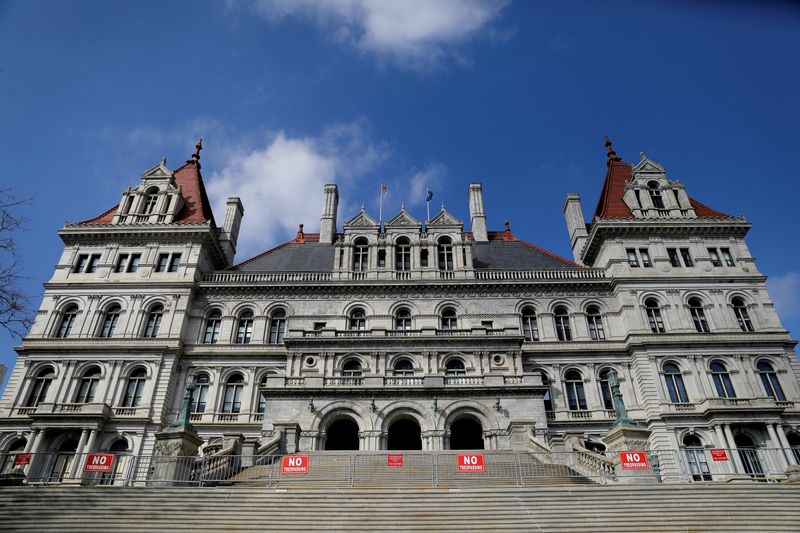By Jonathan Allen
NEW YORK (Reuters) -New York lawmakers began debating how to loosen the state's gun-licensing laws in an emergency session on Thursday to conform with a landmark U.S. Supreme Court decision that established a constitutional right for people to carry weapons in public for self-defense.
The state's Democratic leaders decried last week's Supreme Court decision in a case challenging New York's century-old gun license laws. The six justices in the court's conservative majority ruled it unconstitutional to require law-abiding people to provide "proper cause," or some kind of special need, for concealed-carry handgun licenses for self-defense.
New York Governor Kathy Hochul joined other Democratic leaders in saying the state would obey the ruling but not without protest: she warned the court had "added fuel to the fire" of gun violence.
"They removed our limitations on who can carry concealed weapons," she told reporters, describing the court's vision as allowing guns in crowded venues and bars. "Imagine someone's talking to your girlfriend. You're not real happy about it. And you have a gun and you have a temper and that's what happens."
She ordered the extraordinary session of the legislature in Albany to remove the "proper cause" requirement from the state's gun-license laws while also codifying places where guns would be banned.
New York's efforts to thread the needle of keeping as many gun regulations as possible while obeying the Supreme Court will be closely watched, including by the National Rifle Association and other pro-gun groups.
The new ruling made it easier to challenge and overturn laws governing weapons, and on Thursday the Supreme Court began making its impact clear: the justices threw out recent rulings by lower courts that had upheld bans on assault-style rifles in Maryland and large-capacity ammunition magazines in New Jersey and California.
'SENSITIVE PLACES'
In its ruling in New York State Rifle & Pistol Association (NYSRPA) v. Bruen, the Supreme Court said it would likely accept courthouses, schools and government buildings as "sensitive places" where the public can be barred from carrying weapons, but would frown on applying the label broadly. The ruling explicitly warned trying to deem the entire island of Manhattan a sensitive place would be unconstitutional.
Hochul said she expected New York's list also to include hospitals, day-care centers, parks, zoos, playgrounds and public transit. The NYSRPA has said it would challenge a guns ban on New York City's subway system, which currently lets concealed-carry permit holders bring their guns.
Private businesses will be presumed to be gun-free unless owners post a sign out front saying: "Concealed-carry weapons welcome here," Hochul said.
The Supreme Court also said similar gun-license regimes in California, New Jersey, Hawaii, Massachusetts, Maryland and Washington D.C. are also unconstitutional.
The revised licensing regimes must more closely resemble the gun laws of the 43 states where officials have less discretion to deny people gun licenses, although the court ruled that people with certain kinds of criminal history or mental illness could still be denied the right to carry weapons.
Hochul has said there will be expanded firing-range training requirements before New Yorkers can qualify for a gun permit, and that the state will revive an old law requiring background checks for purchasing certain kinds of ammunition.

But any gun regulation challenged in federal court must now survive a test defined by the Supreme Court last week, which makes a weapons regulation constitutional only if it is similar to limits on arms found in American history, particularly the 18th century, when the Constitution's Second Amendment was ratified.
New York's current gun license rules were codified in 1913.